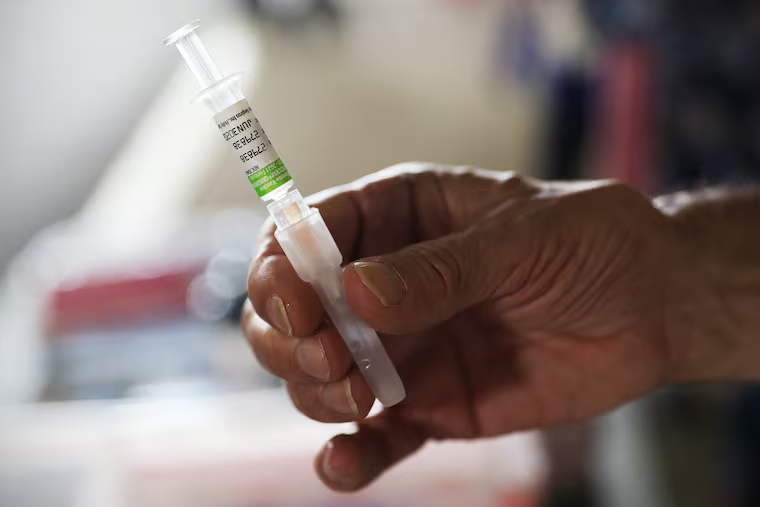Don’t have insurance or can’t afford vaccines? Get them for free from these Philly-area providers
COVID-19, flu, and RSV are of concern this year, especially in at-risk populations like older adults.

Winter is coming, as are the constant reminders to get Influenza, and now COVID-19, booster shots. Everyone knows the drill.
Research has overwhelmingly proven that vaccines are safe, effective, and especially good at protecting older or immunocompromised people — including vaccines for COVID-19, which are under constant study.
The barrage of reminders to get booster shots is in hopes of mitigating the spread of viruses during the winter months, where more people being indoors because of cold weather and holiday gatherings makes it easier for viruses that cause colds, flu, and other respiratory illnesses like COVID-19 and respiratory syncytial virus (commonly known as “RSV”) to spread, according to John Hopkins Medicine.
In response, doctors and health officials like Landrus Burress, Philadelphia’s director of disease control, recommend people get booster shots that are proven to bolster protection during the winter months — primarily to protect loved ones most at risk.
“We understand individuals tend to get a lot closer together around the holiday season, so it’s always best to try and protect yourself and others as much as you can,” said Burress, a Doctor of Public Health (DrPH). “It takes up to two weeks in order for a vaccine to take effect in your system completely, and Thanksgiving is coming up and we have the holidays right after that, so it’s probably best to be more proactive in trying to get that done now than later.”
However, getting everyone vaccinated can be a tall order when only three out of every four Americans believe in the safety of vaccines. According to a University of Pennsylvania survey of 1,559 people in October, only 71% of respondents agree with the statement “vaccines approved for use in the U.S. are safe,” despite evidence for their safety and effectiveness.
Burress suggests everyone get flu and COVID boosters as soon as possible. It’s OK to receive them at the same time too. Side effects, if any, will be mild and pass quickly, according to the Centers for Disease Control and Prevention (CDC).
What’s even better for those who don’t have insurance or whose insurance may not cover the costs of getting vaccinated, is that there are multiple ways to get all these vaccines for free.
How to get vaccines for free
A variety of government programs provide flu and COVID vaccines for free or low cost to adults and children who are under or uninsured. You may be considered underinsured if you have insurance but can’t cover the total cost of care, like vaccines.
These programs provide free or low-cost flu and COVID vaccines:
Pennsylvania State Health Centers (in Philadelphia, that’s the City Health Centers).
Federally Qualified Health Centers (find a center at findahealthcenter.hrsa.gov).
CDC Bridge Access Program (check for free vaccines at vaccines.gov).
Vaccines for Children Program (call 1-888-646-6864 for more information).
Anyone in the U.S., including Delaware and New Jersey residents, can search for providers using these two government-run websites: findahealthcenter.hrsa.gov and vaccines.gov.
Many doctors and pharmacies participate in free or low-cost vaccine programs, including the CDC Bridge Access Program, which partners with CVS and Walgreens. You can start by asking your family doctor or local pharmacies.
Free vaccines in Philadelphia
In Philadelphia, adults and children who are under or uninsured can get free vaccines at any of the eight City Health Centers across the county, according to the City’s Department of Public Health.
All you need to do is make an appointment at phila.gov/services/mental-physical-health/get-vaccinated.
Who should get a COVID-19 booster?
Who is eligible: Everyone five years and older should get one dose of an updated COVID-19 vaccine. People who are moderately to severely immunocompromised can get additional doses.
Updated COVID-19 vaccines became available this fall for the winter’s cold and flu season. Everyone, including people who haven’t been vaccinated yet, will only need one dose of the updated COVID-19 vaccine. According to the CDC, it doesn’t matter which vaccine you get as all the updated vaccines are equally effective.
How much does a COVID-19 shot cost without insurance? According to GoodRx, Pfizer and Moderna’s vaccines cost more than $100 each out-of-pocket. But in the U.S., no one should pay for the cost of the vaccine, including those without insurance.
Who should get a flu vaccine?
Who is eligible: Everyone six months and older should get one dose of a flu vaccine.
How much does a flu shot cost without insurance? According to GoodRx, flu vaccines can range from $25 to $90 out-of-pocket. But, there are plenty of programs to get free or low-cost flu vaccines. Start by asking your doctor’s office or pharmacy.
Who should get an RSV vaccine?
Who is eligible: Adults 60 and older can receive an RSV vaccine based on discussions with their healthcare provider. Pregnant people from week 32 through week 36 of pregnancy can receive an RSV vaccine.
RSV is of most concern in young infants and adults 60 years and older. However, there aren’t any RSV vaccines for infants. Infants younger than eight months, whose parent didn’t receive an RSV vaccine during pregnancy, and are born during or entering their first RSV season, should receive one dose of the monoclonal antibody product, nirsevimab (sold under the brand name Beyfortus), according to the CDC.
How much does an RSV vaccine and treatment cost without insurance? Kaiser Health says RSV vaccines can range from $180 to $295 a shot. In most cases, people with private insurance or Medicare will get the shot without a copay. For people who are uninsured, check with your local health department and Federally Qualified Health Centers.
The monoclonal antibody treatment called, nirsevimab or Beyfortus, costs around $400 to $500 out-of-pocket, according to the CDC, however, under and uninsured children can receive this treatment for free through the CDC Vaccines for Children Program (call 1-888-646-6864 for more information).